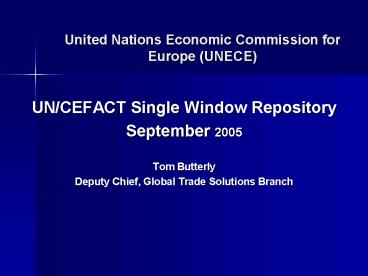United Nations Economic Commission for Europe (UNECE) - PowerPoint PPT Presentation
1 / 14
Title:
United Nations Economic Commission for Europe (UNECE)
Description:
Tom Butterly. Deputy Chief, Global Trade Solutions Branch ... The use of Single Window. compulsory (Finland, Guatemala, Mauritius, Senegal) ... – PowerPoint PPT presentation
Number of Views:20
Avg rating:3.0/5.0
Title: United Nations Economic Commission for Europe (UNECE)
1
United Nations Economic Commission for Europe
(UNECE)
- UN/CEFACT Single Window Repository
- September 2005
- Tom Butterly
- Deputy Chief, Global Trade Solutions Branch
2
Single Window - to enhance the efficient
exchange of information between trade and
government
- A Single Window is a facility that allows parties
involved in trade and transport to lodge
standardized information and documents with a
single entry point to fulfil all import, export,
and transit-related regulatory requirements. If
information is electronic, then individual data
elements should only be submitted once. - UN/CEFACT Recommendation and Guidelines on
Establishing a Single Window, http//www.unece.org
/cefact/recommendations/rec33/rec33_ecetrd352_e.pd
f
3
Single Window Features
- allow traders to lodge standardized information
and documents with a single entry point to fulfil
all import, export, and transit-related
regulatory requirements. - if information is electronic, then individual
data elements should only be submitted once. - sharing of all information in respect of
international trade transactions - provide trade related government information
- receive payment of duties and other charges.
- co-ordinate the controls and inspections of the
various governmental authorities.
4
UN/CEFACT Recommendation Number 33
- Recommendation and Guidelines on Establishing a
Single Window
5
UN/CEFACT Single Window Repository
- The Repository Collection of case studies from
countries that already have operational Single
Windows. - Goal to provide countries that are considering
establishing a SW with concrete examples of the
operation, costs and benefits of such facilities
in other countries. - Format paper publication and on-line Repository,
updated regularly. - Publication Case Studies on Implementing a
Single Window
6
UN/CEFACT SW REPOSITORY Case Studies on ..
- Finland
- Germany
- Guatemala
- Hong Kong SAR (China)
- Mauritius
- Malaysia
- Senegal
- Singapore
- Sweden
- United States.
More case studies to come .
7
Each SW case is described, following a
standardized template, which covers
- Background
- Establishment
- Services
- Operational Model
- Business Model and Costs
- Technology
- Promotion and Communication
- Judicial aspects
- Standards
- Benefits
- Lessons Learned
- Future Plans
- Source for further information
- Contact details.
8
Diversity of SW models adopting to specific
national/regional conditions and requirements
- Financing
- By the State (Finland, Sweden, United States),
- By the private sector (e.g. Guatemala, Germany)
- private-public partnership (e.g. China, Malaysia,
Mauritius, Senegal, Singapore) - The use of Single Window
- compulsory (Finland, Guatemala, Mauritius,
Senegal) - voluntary (China, Germany, Malaysia, Sweden,
United States) - Services
- Free on charge (Finland, Sweden, United States)
- Paid based on various payment schemes (Guatemala,
Germany, China, Malaysia, Mauritius, Senegal,
Singapore)
9
Costs and Benefits of a Single Window
- Benefits
- Faster clearance and release
- Reduced costs through reducing delays
- More effective and efficient deployment of
resources - Predictable application and explanation of rules
- Total implementation costs
- From less than one million US dollars (Guatemala)
to - Between 1and 4 million dollars (Finland, Senegal,
Malaysia). - In the US, the cost was significantly higher but
the system is quite extensive and covers many
additional areas.
Benefits outweigh costs
10
Main obstacles in implementation
- Changing the established business and State
practices (Malaysia, Senegal, Singapore, United
States) - Establishing cooperation and commitment of
various state authorities involved in
import/export procedures (Finland, USA) - Modernizing the technologies currently used by
the State and the private sector (Guatemala), and
small and medium-sized enterprises, in particular
(Sweden).
11
Key factors for success.
- Strong leadership, which can come from the
private (Guatemala) or the public sector
(Malaysia, Senegal, United States, Singapore) - Cooperation and commitment of all stakeholders,
private and public (Finland, Mauritius, Malaysia,
Senegal, United States, Singapore) - User-friendly system, which do not create
complications for usual business procedures
(China, Malaysia, Sweden, Senegal, United States) - Investments in modern technologies (Guatemala,
Malaysia) - Phased, flexible approach (Germany, Mauritius,
Singapore) - Neutrality, transparency and reliability of the
proposed technical solution (Hong Kong SAR
(China))
12
Next Steps
- Meeting in Lyon September 28 to consider common
standards and interoperability for Single Windows
various groups of experts - Workshop in February 2006 on SW Common Standards
and Interoperability
13
UNECE Trade Facilitator Toolkit
- Guidelines for Trade Facilitators how to develop
national series of trade documents - Electronic tools for the design of PDF trade
document forms - User can edit PDF, print and email documents
- Document forms can be extended for integration
into United Nations electronic Trade Documents
(UNeDocs) and Single Window - UN Form Repository
14
Further Information
- Visit
- www.unece.org/cefact
- Or Contact
- Tom Butterly
- Deputy Chief
- Global Trade Solutions Branch
- UNECE
- E-mail tom.butterly_at_unece.org
- Website www.unece.org/trade































